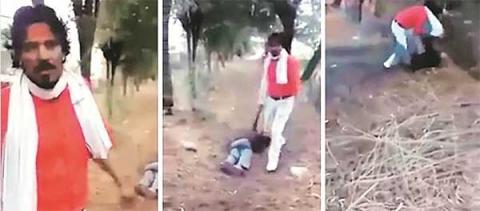India witnessed a disturbing 100 incidents of hate crimes with the rise of Sangh Pariwar during the first half of the current year ending June 2018. With this, incidents of hate crimes have gone up to 603 since Akhlaq was lynched in Dadri, Uttar Pradesh, (National Capital Region) in September 2015, for allegedly killing a cow and storing its meat in his fridge. This is based on data collected by various social research organizations in the country and the global human rights watchdog, the Amnesty International. Union Government’s National Crime Records Bureau (NCRB) in the Ministry of Home Affairs does not maintain records of hate crimes in the country.
Cow related violence and ‘honour’ killings are the most common hate crimes. Hate crimes are committed against Dalits, Adivasis, racial or religious minorities, transgender and other marginalized people. It is pointed out that most of hate crimes are not reported in the media. Hate crimes are criminal acts against people based on their real or perceived connection with particular caste, religion or ethnicity. Hate crimes are different from other crimes as there is underlying discriminatory motive of majoritarian bullying behind such crimes. Hate crimes are motivated by intolerance and majoritarian bullying of Dalits, Adivasis and minorities. However, Indian law, with some exceptions, does not recognize hate crimes as separate offences, which is why the extent of hate crimes in the country is unknown.
According to the reports, Uttar Pradesh recorded the highest hate crimes in 2016 and 2017, followed by Gujarat, Rajasthan and Tamil Nadu. Bihar also recorded a high number of hate crimes. With the NDA Union Government and State Governments concerned having been seemingly complicit in hate crimes, its prosecution has been vitiated by the police playing partisan and not investigating such crimes with attendant fairness, uprightness and seriousness that results in the accused being let off on bail and the victims harassed and prosecuted on make-believe frame up charges. Many of hate crimes are deeply disturbing. Dalits are attacked for merely riding horses, Muslims lynched on rumours of cattle slaughter and Dalit women raped and burnt to death.
It is learnt officially that the Union Ministry of Home Affairs has once again sent Advisories to the States and Union Territories to curb mob lynching and mob violence. It may be noted that such Advisories are a mere formality exhibiting lack of seriousness in the Central Government. Unless the Advisories mandates the States for compliance, non-compliance of which makes a case of breakdown of Constitutional machinery in our rule of law based system of democratic governance and a case of dismissal of concerned State Government is made out, the type of Advisories that the NDA Union Government has been sending are eye-wash designed to hoodwink the people.
No wonder, coming on the heels of ever rising hate crimes in the country, the Supreme Court of India (SCI) has come heavily on the Central Government and State Governments directing it to enact a separate law to deal effectively with spiraling mob lynching and other targeted mob violence against the marginalized before India slides into mobocracy. The apex court, in a recent orders by a bench headed by the Chief Justice of India, Justice Deepak Misra, has condemned mob lynching incidents across the country and directed the Union Government to enact a law to deal with such crimes that threaten the rule of law and the country’s social fabric.
In eleven-point measures that include preventive, remedial and punitive steps against hate crimes of mob lynching and mob violence, the Supreme Court has directed the State Governments to designate district Superintendent of Police in each district to ensure precautionary, preventive and protective measures against hate crimes, intensive checks on social media contents, expeditious trial of the accused by designated fast track courts within a time frame of six months in each districts, a financial compensation package for victims of such crimes and accountability of the governments through their instruments of governance, among others. Stating that “horrendous acts of mobocracy” cannot be allowed to become a new norm, the SCI said if it is found that a police officer or an officer of the district administration has failed to fulfill his duty, it will be considered an act of deliberate negligence.
Now that there is a glimmer of hopes that the NDA Union Government will enact a deterrent law, people of India are exuding confidence that social fabric of the country will not erode further under the watch of the apex court which has always stood by the people in upholding their fundamental right to life and personal liberty amidst social harmony, diversity and co-existence. This is the state of the nation on the occasion of 72nd Independence Day on August 15, 2018 on completion of 71 years of India’s Independence from the British rule!

